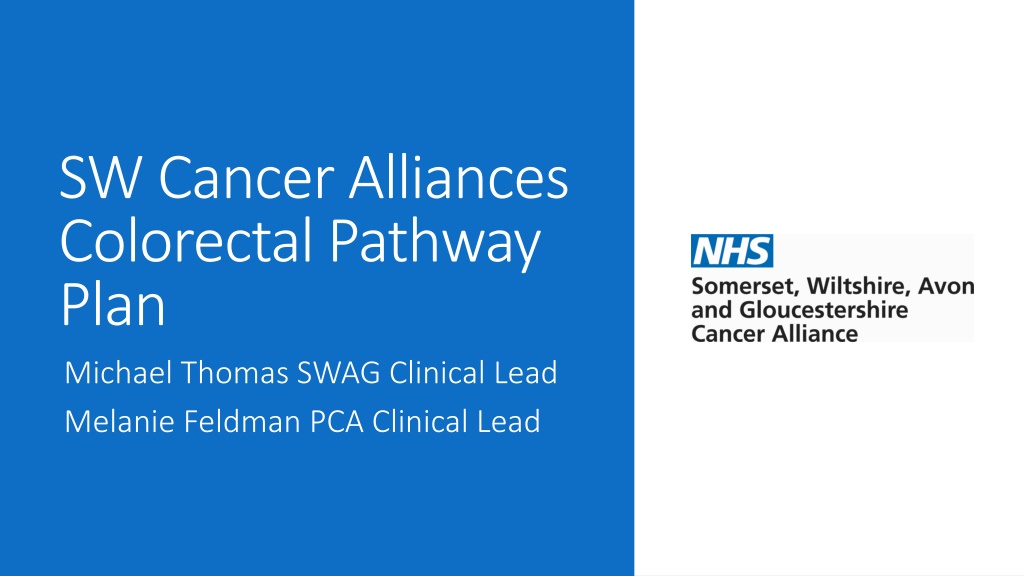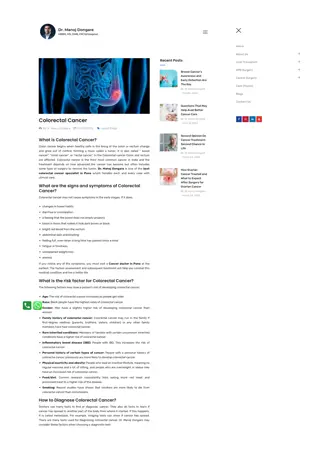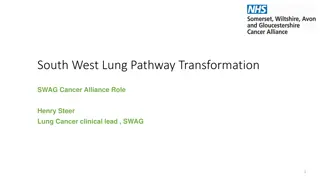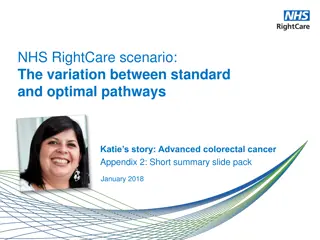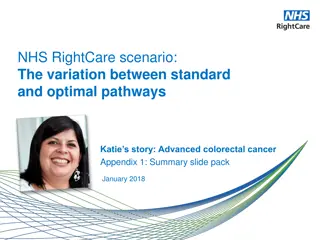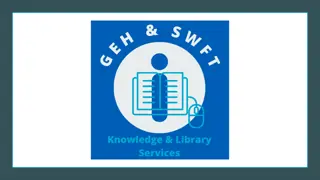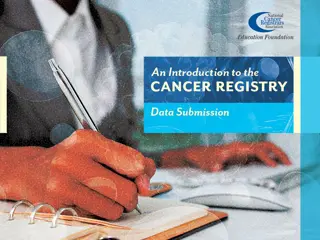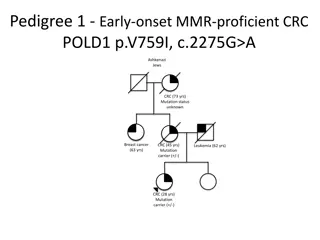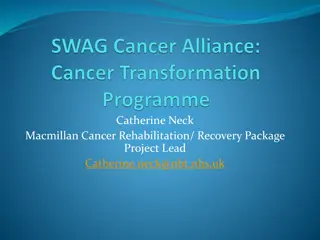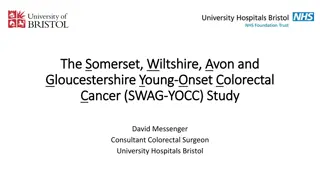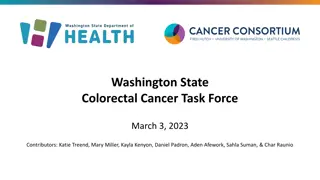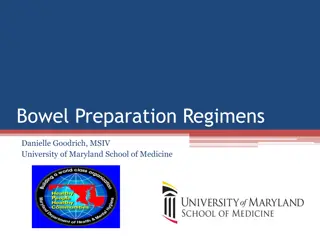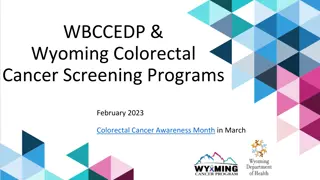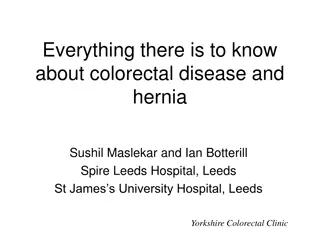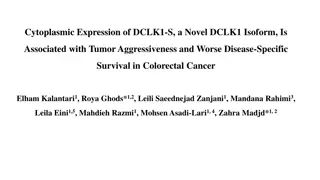Transforming Colorectal Cancer Pathways in the South West
Colorectal cancer, the 4th most common cancer in the UK, presents challenges in timely diagnosis and treatment due to capacity issues in diagnostic services. The SW CRC Pathway Case for Change highlights the need for redesigning pathways to improve patient experiences and outcomes. National initiatives aim to increase early cancer diagnosis rates and enhance access to timely care, aligning with the long-term goal of diagnosing 75% of cancers at early stages by 2028.
Uploaded on Oct 10, 2024 | 0 Views
Download Presentation

Please find below an Image/Link to download the presentation.
The content on the website is provided AS IS for your information and personal use only. It may not be sold, licensed, or shared on other websites without obtaining consent from the author. Download presentation by click this link. If you encounter any issues during the download, it is possible that the publisher has removed the file from their server.
E N D
Presentation Transcript
SW Cancer Alliances Colorectal Pathway Plan Michael Thomas SWAG Clinical Lead Melanie Feldman PCA Clinical Lead
The SW CRC Pathway Case for Change The SW CRC Pathway Case for Change Mike to add to slides as appropriate Mike to add to slides as appropriate CRC is the 4th most common cancer in the UK, 42000 are diagnosed each year. More than doubling referrals into cancer diagnostic pathways since 2015, a gap in capacity for endoscopy and radiology provision, surgical and oncology services, and a financially limited environment 2WW pathways have become seen as a reliable means of ensuring a patient is investigated promptly The pathways consume huge volumes of resource for those without cancer, people often being referred into the pathways year after year after year. limited diagnostic capacity means that patients in routine pathways have extended waits yet 20% of cancer patients start in routine pathways and 20% don t present at all until an emergency develops these people having more advanced disease
The SW CRC Pathway Case for Change The SW CRC Pathway Case for Change Mike to add to slides as appropriate Mike to add to slides as appropriate SW Clinical Senate Sept 2018 To what extent are providers in the South West able to deliver the national commissioning pathways for colorectal cancer patients? What are the key areas for pathway redesign and provision of service that will improve the quality of experience & timeliness of treatment for patients across the region? One model of care will not suit all yet the drive to constantly find local solutions to local problems leads to duplication of work, paralysis in the face of huge challenge and inequitable provision of services which leads to compromised patient outcomes.
National Drivers National Drivers The national cancer strategy The national cancer strategy - ambitious aim to make significant progress in reducing preventable cancers, increasing cancer survival and improving patient experience and quality of life. Survival rates for cancer have never been higher, and overall patients report a very good experience of care. However, earlier and quicker diagnosis will have a major impact on survival. Variation in access to care also needs to be addressed. Early diagnosis, fast diagnosis, and equity of access to treatment and care are central to the National National Cancer Cancer Programme Programme and the transformation of services we want to achieve. Cancer and the NHS Long Term Plan Cancer and the NHS Long Term Plan - Diagnose 75% of cancers at stage 1 or 2 by 2028 Rapid Diagnostic Pathway Rapid Diagnostic Pathway - - improved number of cancers diagnosed within improved number of cancers diagnosed within 28 days by March 2020 28 days by March 2020
Illustrates a simplified portrayal of a very complex system As CRC, and its precursor ( polyps) are more prevalent with age many patients have additional health problems which can be exacerbated by diagnostic tests, treatments can be life threatening or life changing. Though the volume of referrals has led to streamlined and automated pathways there will always be moments for complex shared decision making and these can occur at multiple steps in the pathway. Plus, limited IT abilities may mean that apparently simple administrative steps involve multiple organisational and human factor aspects with inbuilt and unrecognised delay. Staging tests may be contraindicated MRI with some metal devices within the body, inconclusive biopsies needing repeat, or lead to additional tests when significant incidental findings are present. Arranging appointments can involve several steps in series over several days, dependent on individuals being present at work and not switched to doing different urgent work.
Project Approach & Outcomes Project Approach & Outcomes Peer review visits with two outputs Peer review visits with two outputs: 1. A report for each Trust outlining areas of strength, weakness, challenge and good practice. 2. A handbook of the good practice and practical solutions in use throughout the region which can be used as a resource for change elsewhere. The peer review need not be onerous, mixing collection of established data sets with site visits where decision making can be discussed and patient views sought. Melanie Feldman Clinical Lead PCA Site Visits Potential dates Site Visits Potential dates Mike Thomas Clinical Lead SWAG Site visits are the key time when clinicians can learn about each others practice and build networks across the region. Timetable will be shared once finalized Ousaima Alhamouieh Transformation Project Manager SW Pathway Group
Deconstructing the Pathway Deconstructing the Pathway (How is currently care provided?) (How is currently care provided?) Case 4: 89 years woman, active, works 1 day a week on a voluntary basis, no comorbidities. Distal sigmoid tumour found. No metastasis. Case 1: 52 years old woman, anal lump, biopsy = SCC+AIN Case 2: 39 years old man, recently married, rectal cancer 1cm above top of anal sphincter + tethered anteriorly Case 5: 72 man, PMH, MI a month ago, started duel antiplatelet therapy, diarrhea & bleeding since. Impassable tumour, narrow lumen Case 3: 65 years man, weight loss, right sided abdominal mass & anaemia. Vomiting most meals. Case 6:56 woman, upper abdominal pain & back pain. qFIT positive.
Deconstructing the Pathway Deconstructing the Pathway (How is currently care provided?) (How is currently care provided?) Benchmarks in Place & Current Challenges Benchmarks in Place & Current Challenges
Data Reports to support identifying gaps Data Reports to support identifying gaps Importance of data to identify gaps in the current care models How are diagnosis communicated to patients? patients?. Working to get a snapshot of the current practice to identify where can improvement be made made, where can variation be reduced can variation be reduced in a standardized and timed approach to shorten pathway. This will allow us to assess if the future change ideas work and are fit for the future! How are diagnosis communicated to improvement be Time 1 Time 2 Time 3 Time 4 Time 5 Time 6 Time 7 Tests ordered Test results Decision to treat Referral First seen MDT Diagnosis Mean and Median Times for each step
Project Plan Detail May 2019 Project Plan Detail May 2019 March 2020 March 2020 CA collate data from the cancer dashboard on waiting times, volumes of work, from NBOCAP (reports have a lag time of 18-24 months) on a variety of indicators related to quality and process, the NCES, PHE on BCSP uptake and follow on work, HES data on admissions elective / emergency CA request additional data from providers to illustrate additional areas of practice (e.g. local 2WW referral forms, protocols for straight to test, MDT referral / outcome forms) cancellations due to lack of HDU provision, availability of perioperative medicine / CPET), median time to histology reports, waiting time for start of chemotherapy, and diagnostic waits Clinical teams to receive introductory information about the review, explanation of the principle of analysing decision making and processes. Examples provided of deconstructed pathways and a request that teams consider carefully how their pathways work and where the inefficiencies remain Site visit clinician to present the means of making decisions and the challenges in processes. Visiting team to include both CNS and consultant member as a minimum. Afternoon group discussion with a patient group and clinicians from the MDT Preliminary report to executive team at the end of the day CA to provide a written report to each Trust MST/ exec team shared with local commissioners CA to construct a Toolkit summarising good practice approaches to major areas of (1 1) ) decision the the end end of of the the review review, offered to all Trusts and commissioners in the South West and publicly available. This would be short descriptions of each challenge, how the team approached the problem, stakeholders involved, practical steps needed to implement change decision making making and ( (2 2) ) process process constructed constructed at at
Increased numbers of colorectal cancer patients being diagnosed within 28 days Increased numbers of colorectal cancer patients being diagnosed within 28 days Delivery of 8 wait times standards Delivery of 8 wait times standards b. effective cross-organizational working a. Increased capacity c. supply and demand management The Metrics The Metrics % Patients diagnosed at stage 1 or 2 % Patients diagnosed at stage 1 or 2 Improved Patient experience Improved Patient experience Saved Saved
CHART OF POTENTIAL 12 MONTH ROADMAP FOR 19/20 CHART OF POTENTIAL 12 MONTH ROADMAP FOR 19/20 1 1 2 2 3 3 4 4 5 5 6 6 7 7 8 8 9 9 10 10 Jan Jan 20 20 11 11 Feb Feb 20 20 12 12 Mar Mar 20 20 Actions Actions Apr 19 Apr 19 May 19 May 19 Jun 19 Jun 19 Jul 19 Jul 19 Aug 19 Aug 19 Sep 19 Sep 19 Oct 19 Oct 19 Nov 19 Nov 19 Dec 19 Dec 19 A Discover Discover - - Benchmark B Define Define Standards agreed by SW pathway group C Develop Develop Self Assessment, peer visits and report D Deliver Deliver Quality Standards Framework E Evaluation Evaluation - - F Milestone report Milestone report The project will begin in May 2019 with a first The project will begin in May 2019 with a first milestone report expected Sep,19. milestone report expected Sep,19.
Next Steps Next Steps 25th th July, Exeter July, Exeter. First SW Colorectal Cancer Pathway Delivery Group 25 Members will represent their professional group in pathway improvement work programme activities, as well as action responsibilities as agreed. SWAG Proposed Names SWAG Proposed Names Eric Thomas (radiologist) Hannah Madder (Cancer Service Manager) Jasmine King (CNS) Ben Colleypriest (Gastroenterologist representative) Jackie Mifflin (Patient representative) Harker Nicola (GP representative) Emma Fynn (Cancer service improvement lead) Clinical Leads will be in touch to arrange peer visits. Volunteers who are willing to support the steering group please ! Volunteers who are willing to support the steering group please !
